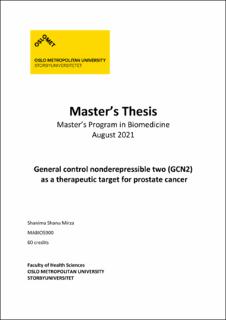| dc.description.abstract | Prostate cancer (PC) is the second most common cancer in men worldwide. Primary PC is treated by surgery, radiotherapy or high dose-rate brachytherapy and androgen deprivation therapy (ADT) – and this is usually very effective initially. However, most of the PC patients relapse after ADT and progress to castration-resistant prostate cancer (CRPC), which is not curable. General control nonderepressible 2 (GCN2) is a protein kinase, best known for its important role in the response to nutritional changes such as shortage of amino acids and glucose, as well as in other stresses. Since cancer cells are often in a hostile microenvironment, the standing view is that GCN2 is important for cancer cells to survive and thrive. However, the importance of GCN2 in the context of PC has not been studied. This project aimed to explore the role and regulation of GCN2 in PC, as well as that of a known activator, GCN1, to address whether GCN2 might be an effective therapeutic target for the treatment of prostate cancer. | en_US |
